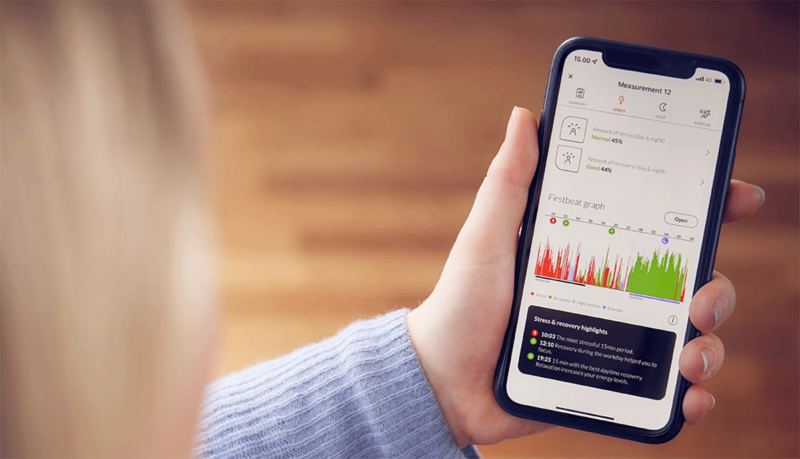
The body and the mind are closely interconnected. If your physical health is challenged, it will quickly affect your mental well-being, or if your mind is struggling, it’s reflected in your physical wellness and health. By training your mind, you can avoid a negative cycle and impact your stress management and well-being in a positive way.
Our mind – thoughts, emotions and awareness – and our behaviors are constantly connected to each other. Emotions activate the autonomic nervous system and cause physiological reactions, such as changes in heart rate or heart rate variability. In general, negative emotions activate the sympathetic nervous system and production of stress hormones, whereas positive emotions activate the parasympathetic nervous system and relaxation.
The more we understand how the mind and body are connected, the better prepared we are to make necessary changes to the way we think and act. Good physical and mental resources support comprehensive well-being.
Do You Recognize the Thoughts Behind Negative Emotions?
A continuous stream of negative thoughts maintains or aggravates stress and promotes typical stress behaviors. It’s surprisingly easy to get to a point where we are no longer aware of the thoughts behind our emotions or how they affect the body and our behaviors. Recognizing one’s own thoughts is difficult because thought processes are often quite automatic.
Negative emotions do not have to be totally avoided because they provide valuable information that something is not right, and that the situation needs addressing. However, it is important to understand the reasons behind those emotions, so you can start influencing them.
- What causes me stress at work – that I have too much work, or that I’ve not managed to prioritize my tasks sensibly?
- Is it me, or my boss, that demands too much from me?
- Are my nerves on edge because I’m too busy and don’t have enough of my own time, or because I’m incapable of saying no” and setting boundaries?
- Do I dare to speak my mind and say what I want or don’t want, or what bothers me?
If you don’t look for a solution, there is a risk that negative emotions and thoughts can become chronic and eventually turn into pessimism, chipping away at your mental well-being. A negative mood and pessimistic outlook can also be associated with a physically passive lifestyle or physical symptoms, such as headaches.
Training Your Mind Helps with Stress Management
A flexible mind means the ability to recognize your own thoughts and emotions and learning not to let them overpower you. It’s the opposite of the automatic emotional reactions that we easily get caught up in.
A flexible mind helps reduce stress both at work and in life in general. It is the basis of daily well-being and key to making changes to your behaviors or learning to express your needs to others.
Being able to control your energy levels and stay focused without your thoughts wandering, and the ability to control your emotions and interrupt negative thoughts promotes success in all areas of life, from relationships to work projects.
This is necessary if you want to improve your stress management, learn to tolerate uncertainty and challenges, succeed in things that are important to you, cross difficult hurdles, or stay focused on the task at hand.
Just like physical skills, mental skills and flexibility can also be improved by training them regularly. Mental skills include, for example, self-knowledge, ability to concentrate, positive self-talk, and the ability to relax. You can get started with some simple exercises or habits:
- Improve your concentration and energy with meditation.
- Relax your mind and body with breathing exercises. They can also help you power down and lower your activation level.
- Calm your mind in nature. Look, listen, and focus on the moment.

Firstbeat Life connects the dots between your body’s reactions and daily activities. You learn how to sleep better, manage stress, and exercise right.
A Tip for Firstbeat Life Users
Firstbeat Life allows you to monitor the effect of training your mind on your overall stress management and recovery. Physiological data can visualize and help you understand the connections between your mind and body.
You can monitor, for example, the effect of meditation on your stress level, learn what kind of relaxation activities help you recover, or find out good ways to forget about work and let your mind relax during leisure time. Why not start a new measurement, record your mind training in the journal and see what the result looks like?
Regular measurements help track your progress and identify the best ways for you to support good well-being of the mind and the body. Learn more about Firstbeat Life.
Balance stress and recovery for better health. Firstbeat Life helps you discover what’s right for you and how to improve your physical and mental well-being, one small change at a time.
If you liked this article, you should subscribe to our newsletter.
You might also be interested in

What Does a Good Work-Life Balance Mean to You?
It’s a popular topic of discussion nowadays, but what does work-life balance really mean? Work-life balance is about how we use our time, resources, and energy between these two aspects…

How to Help Your Employees Manage Stress – Tools for the Employer and HR
The word “stress” often has a negative meaning. However, the truth is that without stress we would find it very hard to cope with our day to day lives. Stress…

Firstbeat Life: How Do You Get Employees Engaged in Corporate Wellness?
When it comes to corporate wellness, one of the most common problems is getting employees engaged. So, what to do? Our specialist gives concrete tips, how to get employees commit to small changes.

